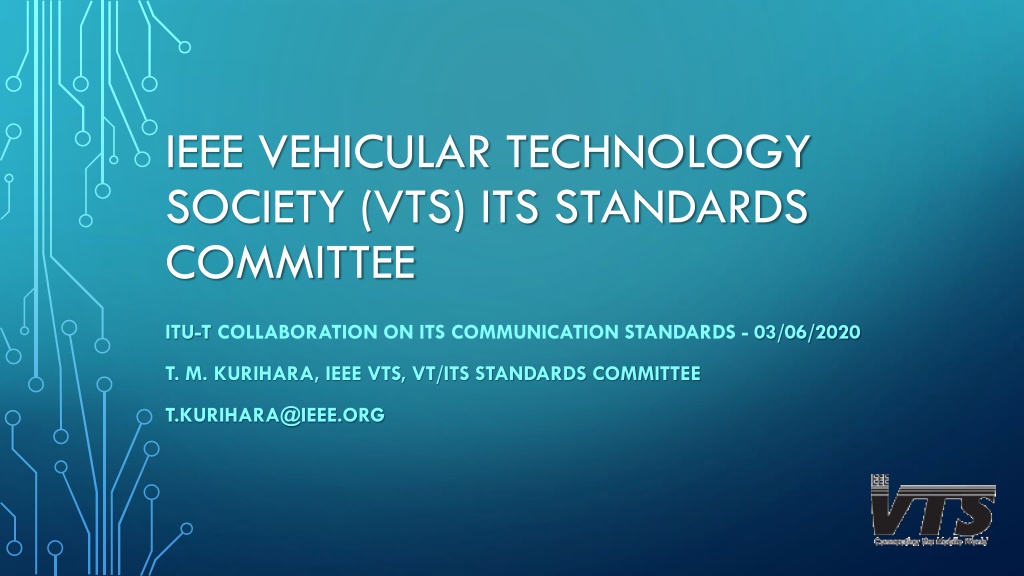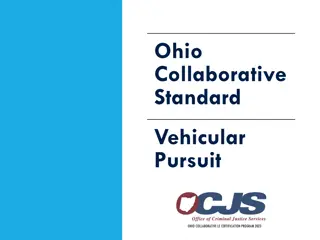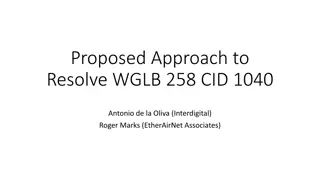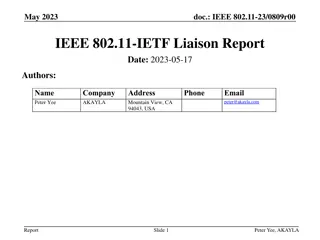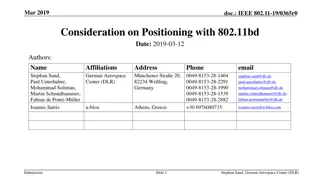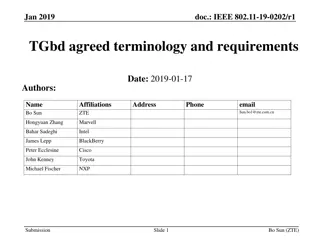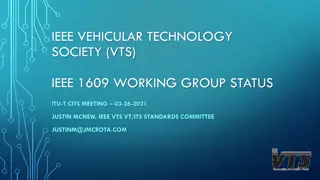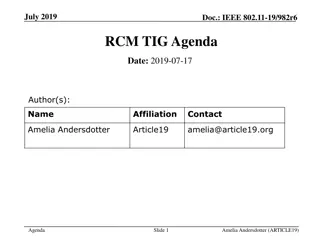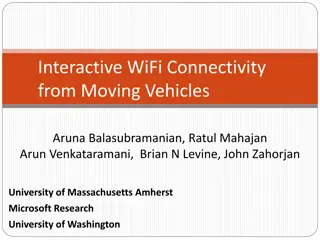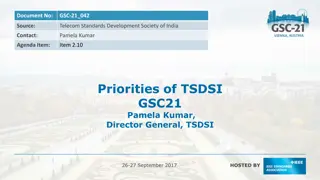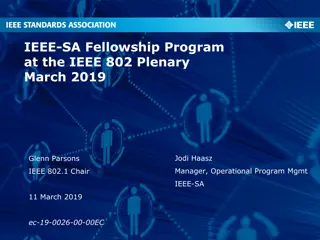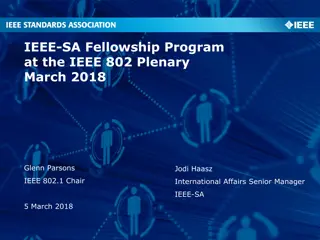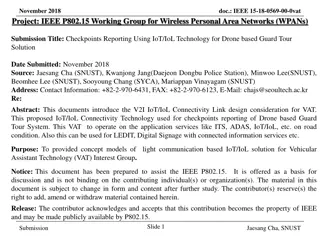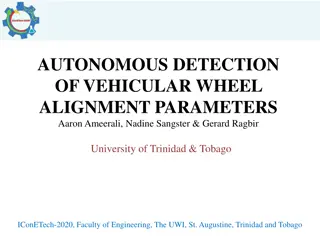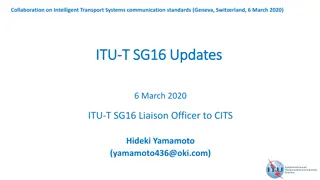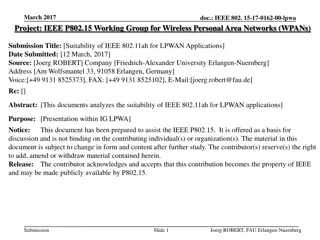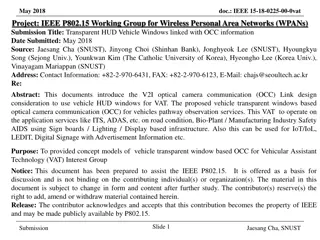IEEE Vehicular Technology Society Standards Update
The Vehicular Technology Society (VTS) and its standards committees, in collaboration with ITU-T, are focused on communication standards for automated vehicles. This update covers approved scopes and new project authorization requests related to extending functionality and ensuring security in vehicular environments. The standards aim to enhance interoperability, sensing technologies, decision-making processes, and human-vehicle interactions while addressing reliability, data transport mechanisms, and security considerations.
Download Presentation

Please find below an Image/Link to download the presentation.
The content on the website is provided AS IS for your information and personal use only. It may not be sold, licensed, or shared on other websites without obtaining consent from the author.If you encounter any issues during the download, it is possible that the publisher has removed the file from their server.
You are allowed to download the files provided on this website for personal or commercial use, subject to the condition that they are used lawfully. All files are the property of their respective owners.
The content on the website is provided AS IS for your information and personal use only. It may not be sold, licensed, or shared on other websites without obtaining consent from the author.
E N D
Presentation Transcript
IEEE VEHICULAR TECHNOLOGY SOCIETY (VTS) ITS STANDARDS COMMITTEE ITU-T COLLABORATION ON ITS COMMUNICATION STANDARDS - 03/06/2020 T. M. KURIHARA, IEEE VTS, VT/ITS STANDARDS COMMITTEE T.KURIHARA@IEEE.ORG
VT/AV STANDARDS COMMITTEE - APPROVED Scope: The Vehicular Technology Society Automated Vehicle (VT/AV) Standards Committee includes functions and components within the IEEE interests, including, but not limited to: Automated vehicular systems and technologies Interoperability Sensing, detection, controls and decision-making artificial intelligence machine learning reliability of sensing and decision-making test and verification, including experimental and virtual techniques Human-vehicular interaction Information exchange Initiated by European IEEE Office
NEW VT/ITS PROJECT AUTHORIZATION REQUEST (PAR) P1609.20, Recommended practice for extending the functionality of IEEE Std 1609.2 This document provides guidance to standards development organizations and other stakeholders as to how they may develop additional functionality compatible with IEEE Std 1609.2 Intended to extend 1609.2 to show how this can be done without creating duplicate field identifier assignments or other conflicts, and how to coordinate those changes with the 1609 WG PAR approval expected in April 2020 P1609.2REV, Standard for Wireless Access in Vehicular Environments--Security Services for Application and management messages Revision to include guidance documents and two amendments issued since approval of Std 1609.2-2016 PAR approval expected in March 2020
NEW VT/ITS PROJECT AUTHORIZATION REQUEST (PAR) P1609.13, Wireless Access in Vehicular Environments - Reliable Data Transport Mechanisms for Multiple Receivers Provides mechanisms for distribution of data within the Wireless Access in Vehicular Environments (WAVE) system These mechanisms are optimized for use in the vehicular environment, where connectivity may be intermittent; for large data transfers; and for data which is of interest to a large number of system participants Considerations addressed by the standard include image identification and versioning, discovery, distribution, error correction, and security PAR approval expected in April 2020
NEW VT/ITS PROJECT AUTHORIZATION REQUEST (PAR) P1609.3REV, Standard for Wireless Access in Vehicular Environments (WAVE) - - Networking Services Defines services, operating at the network and transport layers, in support of wireless connectivity among vehicles and intelligent Transportation Systems (ITS) devices and other participants in a transportation system Specifies the open system interconnection (OSI) layer 3, networking, and layer 4, transport, protocols and interfaces that enable secure, low-latency, and ad hoc communication among participants in a transportation system
VT/ITS STANDARDS COMMITTEE PROJECTS IEEE 1609 Wireless Access in Vehicular Environment (WAVE) Working Group IEEE 1609.0 -2019, IEEE Guide for Wireless Access in Vehicular Environment (WAVE) Architecture IEEE 1609.2 -2016, IEEE Standard for Wireless Access in Vehicular Environments--Security Services for Applications and Management Messages (Amendments 1609.2a-2017 and 1609.2b-2018) IEEE P1609.2.1 - Wireless Access in Vehicular Environments (WAVE) -- Certificate Management Interfaces for End-Entities [Collaborating with other SDOs] IEEE 1609.3 -2016, Standard for Wireless Access in Vehicular Environments (WAVE) -- Networking Services [Revision in development, adding other media capability] IEEE 1609.4 -2016, IEEE Standard for Wireless Access in Vehicular Environments (WAVE) -- Multi- Channel Operation (Cor1 - 2019 published) IEEE 1609.11 - 2010, IEEE Standard for Wireless Access in Vehicular Environments (WAVE)-- Over- the-Air Electronic Payment Data Exchange Protocol for Intelligent Transportation Systems IEEE 1609.12 -2019, IEEE Standard for Wireless Access in Vehicular Environments (WAVE)-Identifiers
IEEE VT/ITS 1609 WORKING GROUP Next meetings April 27-28 2020, NXP (south), Austin, TX co-located with OmniAir Plug Test for C-V2X and WAVE devices June 11-12 or 23-24, 2020, host, venue, TBC September 22-23, 2020, host, venue, TBC Teleconference scheduled as required in between F2F meetings Collaboration with IEEE P802.11 TGbd, Amendment: Enhancements for Next Generation V2X Scheduled teleconferences Joint session during 802.11bd in February 2020 completed Joint member active participation with technical contributions Collaboration with SAE V2X Communication Steering Committee Through members of 1609 WG who attend the Nine (9) Technical Committees (seven new established in early 2019) under the V2X Communication Steering Committee formed in early 2019
VTS VT/ITS STANDARDS COMMITTEE PROJECTS P1920.2, Standard for Vehicle to Vehicle Communications for Unmanned Aircraft Systems Defines the protocol for exchanging information between the vehicles. The information exchange will facilitate beyond line of sight (BLOS) and beyond radio line of sight (BRLOS) communications Provides a means to share mission-critical information among unmanned aircraft systems Joint project of VT/ITS Vehicle-to-Vehicle Communications for Unmanned Aircraft Systems (VT/ITS/V2V for Unmanned) with IEEE Communications Society/ Mobile Communication Networks Standards Committee (COM/MobiNet-SC)
VTS VT/ITS STANDARDS COMMITTEE PROJECTS P2020, Standard for Automotive System Image Quality Addresses the fundamental attributes that contribute to image and quality for automotive Advanced Driver Assistance Systems (ADAS) applications, as well as identifying existing metrics and other useful information relating to these attributes Defines a standardized suite of objective and subjective test methods for measuring automotive camera image quality attributes, and it specifies tools and test methods to facilitate standards-based communication and comparison among OEM and Tier 1 system integrators and component vendors regarding automotive ADAS image quality Expected approval before December 2020
VTS VT/ITS STANDARDS COMMITTEE PROJECTS P7001, Transparency of Autonomous Systems Describes measurable, testable levels of transparency, so that autonomous systems can be objectively assessed and levels of compliance determined Provides the means to assure safety, and allow accountability and traceability Autonomous Systems Validation Working Group, expects approval by December 2020 P2030.1.1REV, Standard Technical Specifications of a DC Quick and Bi- directional Charger for Use with Electric Vehicles Specifies the design interface of electric vehicles and direct current (dc) bi-directional chargers that use battery electric vehicles as power storage devices Expected approval by December 2020
VTS VT/ITS STANDARDS COMMITTEE PROJECTS IEEE Std 2690-2018, Standard for Charging Network Management Protocol for Electric Vehicle Charging Systems Defines communications between Electric Vehicle Charging Systems (EVSC) and a device, network, and services management system, which is typically based "in the cloud" but could also include interfaces to site-specific components or systems (e.g. building energy management systems) Provides a basis for increasing functionality and interoperability between EVCS and charging services networks VT/ITS Charging Network Management Protocol Working Group (VT/ITS/CNMP)
THANK YOU If you can t fly then run, if you can t run then walk, if you can t walk then crawl, but whatever you do you have to keep moving forward. Martin Luther King, Jr
